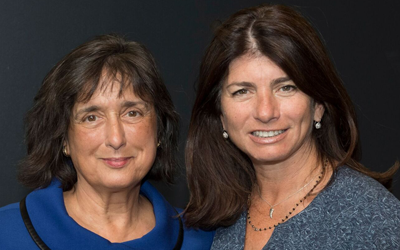
Make 4x the Impact in the Fight to End Alzheimer’s
Make 4x the Impact in the Fight to End Alzheimer’s
For a limited time, your gift can go four times as far to support essential care, support and research — thanks to our Flash 48-Hour 4x Match Challenge. Give now before the match ends at midnight on Feb. 20.
Donate NowResearch

Dr. Roberta Diaz Brinton and Elizabeth Gelfand Stearns.
Thanks to the generosity of our over 3,000 donors nationwide, The Judy Fund supports scientsists at the forefront of the fight to end Alzheimer’s. To date, the fund has advanced more than 30 Alzheimer’s Association peer-reviewed research projects, allowing dementia scientsists to pursue vital answers to important scientific questions about the disease.
These researchers are exploring the causes of Alzheimer’s, prevention and detection strategies and the best approaches to treatment and care. Some of the most impactful research projects we have sponsored include:
Alzheimer’s Association Women’s Alzheimer's Research Initiative (WARI)
With landmark support from The Judy Fund, 22 researchers have received support to study how sex and gender contribute to Alzheimer's and other dementias.
Rachel Buckley, Ph.D., Massachusetts General Hospital, Boston
Sex, Tau Accumulation, and the Role of Menopause in Alzheimer's Disease Pathogenesis
2020 Alzheimer's Association Research Fellowship
Karyn Frick, Ph.D., University of Wisconsin-Milwaukee
Novel Estrogen Receptor-Selective Agonists as Therapeutics for Alzheimer's Disease
2022 Alzheimer's Disease Strategic Fund: APOE Biology in Alzheimer’s
Paola Gilsanz, Sc.D., Kaiser Foundation Research Institute, Oakland, California
Social and Biological Drivers of Sex Inequities in Dementia and Cognition
2019 Alzheimer's Association Research Grant to Promote Diversity
Cindy Barha, Ph.D., University of British Columbia
Sex Differences in Exercise Efficacy: Possible Role of Brain-Derived Neurotrophic Factor and Stress Axis
2017 Alzheimer's Association Research Fellowship
Randall Bateman, M.D., Washington University in St. Louis
A Blood Isotope Labeled Amyloid-Beta Test for Alzheimer's Disease
2011 Zenith Fellows Award
Your support could boost crucial efforts to identify a cure. Help us accelerate research by donating today.
Alzheimer’s Association Women’s Alzheimer’s Research Initiative (WARI)
Alzheimer’s Association Women’s Alzheimer’s Research Initiative (WARI)
The Alzheimer’s Association created the Women's Alzheimer’s Research Initiative (WARI) to help unlock the mysteries of Alzheimer’s disease in women. A woman’s estimated lifetime risk of developing Alzheimer’s at age 65 is 1 in 6 (for men it is 1 in 11), and nearly two-thirds of the more than 5 million Americans already living with the disease are women. This disparity cannot be fully explained by women’s greater longevity and lower death rates relative to men.
With generous support from The Judy Fund and others, the Alzheimer’s Association made nine $250,000 awards in 2016 to scientists for investigations into how sex and gender contribute to dementia. These studies included:
- Whether there are sex differences in the mechanisms that underlie stress and Alzheimer’s disease
- Whether APOE4, a gene associated with the greatest increased risk of developing Alzheimer’s at age 65 or older, impacts the effects of estrogen on brain function
- Whether there are sex differences in the way risk factors interact to influence the development of Alzheimer’s
To enable more research in this promising area of dementia science, The Judy Fund has committed more than $1 million since 2017 to sponsor seven additional grants to investigators studying sex and gender in Alzheimer’s:
- Dr. Cindy Barha is studying how exercise affects the brains of men and women differently.
- Dr. Rachel Buckley is looking at the higher rates of tau protein accumulation in women and its impact on cognitive performance.
- Dr. Paola Gilsanz is studying how social and biological factors influence risk of cognitive decline and dementia in males and females.
- Dr. Karienn Montgomery’s investigation could provide new information on how nerve cell communication is disrupted in Alzheimer’s disease and how these mechanisms may differ between males and females.
- Dr. Aleph Prieto is investigating whether there could be sex-specific differences in how biological processes modulate nerve cell communication signals in the brain in Alzheimer’s.
- Dr. Adriana Strutt is exploring whether a new tool she developed called SASEI (Strutt Adult Sexual Expression Inventory) can help identify and measure changes in sexual behavior in people with Alzheimer’s and other dementias.
- Dr. Kristen Zuloaga is exploring the interplay between menopause and metabolic diseases and how it could impact the development of Alzheimer's.
All of these studies will make important contributions to inform early detection, treatment and prevention strategies for women and men alike.
Rachel Buckley, Ph.D., Massachusetts General Hospital
Rachel Buckley, Ph.D., Massachusetts General Hospital
Dr. Buckley is leveraging brain scan data from several studies of aging to explore the roles of sex, tau accumulation, and menopause in Alzheimer’s disease pathogenesis. One of her team’s findings is that women who reported menopause at an earlier age experienced higher levels of tau accumulation later in life.
Findings from this study were published in an article in the Annals of Neurology, which is hyperlinked below. Leveraging additional funding from the Association, one of Dr. Buckley’s co-authors, Emer McGrath, M.D., acknowledges contributions to the findings via her 2018 Alzheimer’s Association Clinician Scientist Fellowship for an investigation titled, “Serum Biomarkers for Predicting Cognitive Decline and Dementia.”
Since receiving her award, Dr. Buckley has obtained grants to date totaling more than $4.6 million from the National Institute on Aging (NIA), a part of the National Institutes of Health (NIH), for her research on the role of sex and gender in Alzheimer’s and on resilience and risk in Alzheimer’s.
Karyn Frick, Ph.D., University of Wisconsin-Milwaukee
Karyn Frick, Ph.D., University of Wisconsin-Milwaukee
Paola Gilsanz, Sc.D., Kaiser Foundation Research Institute, Oakland, California
Paola Gilsanz, Sc.D., Kaiser Foundation Research Institute, Oakland, California
Past studies suggest that the effects of risk and protective factors for dementia may depend on biological sex. Given that women live longer than men, Dr. Gilsanz believes women may have longer exposure to both risk and protective factors (such as heart health and lifestyle factors) for dementia and cognitive decline.
Dr. Gilsanz used resources and historical data collected as part of the Kaiser Permanente Northern California (KPNC) health care delivery system. KPNC brings together information from over 300,000 members of the health care delivery system who participated in a series of optional check-ups offered in their routine care in San Francisco and Oakland between 1964 and 1992. The data collected here includes blood pressure, urine samples, medical history, current health questions, etc. In addition, cognitive measures were collected on a portion of older adults in this study. Leveraging these rich and diverse data sets, Dr. Gilsanz examined the role of education and occupation as possible factors contributing to sex differences in dementia and cognitive function in older adults.
Dr. Gilsanz has obtained more than $24 million in funding from the NIA for related research since receiving her Association award.
Randall Bateman, M.D., Washington University in St. Louis
Randall Bateman, M.D., Washington University in St. Louis
Mounting evidence suggests that the Alzheimer’s disease process may begin 10-20 years before clinical symptoms appear. Detecting the disease via the measure of biological changes, or “biomarkers,” is critical for developing and testing interventions that could have a major impact on the course of the disease, especially when there are no symptoms.
To help advance early detection and diagnosis of Alzheimer’s disease The Judy Fund sponsored a Zenith Fellows Award to Dr. Randall Bateman in 2011. He is using novel methods to create a simple blood-based test to measure the levels and rates of clearance of beta-amyloid to help reliably detect and understand how this protein relates to the early stages of Alzheimer’s disease.
In 2017 Dr. Bateman presented promising findings suggesting that measuring beta-amyloid in blood has potential to identify those at most risk with 89 percent accuracy. Today his work continues, and he is joined by many other scientists in this area.
Cindy Barha, Ph.D., University of British Columbia
Cindy Barha, Ph.D., University of British Columbia
Dr. Barha and colleagues acquired data from two randomized clinical trials to investigate sex differences in exercise. In BMC Biology of Sex Differences, the team reports finding that aerobic training enhances cognitive function, specifically executive functions, with greater effects seen in older females compared with older males. These effects were observed in older adults with vascular cognitive impairment and cognitively unimpaired older adults.
A meta-analysis showed that resistance-strength training is associated with greater improvements in executive functions in studies with a higher proportion of females than males. Dr. Barha and colleagues also found that aerobic training increases BDNF levels to a greater extent in females than males and that greater physical activity is associated with larger volumes in a brain area important for executive functions in females only.
